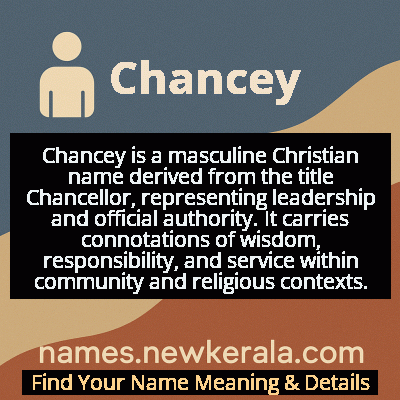Chancey Name Meaning & Details
Origin, Popularity, Numerology Analysis & Name Meaning of Chancey
Discover the origin, meaning, and cultural significance of the name CHANCEY. Delve into its historical roots and explore the lasting impact it has had on communities and traditions.
Name
Chancey
Gender
Male
Origin
Christian
Lucky Number
5
Meaning of the Name - Chancey
Chancey is a masculine Christian name derived from the title Chancellor, representing leadership and official authority. It carries connotations of wisdom, responsibility, and service within community and religious contexts.
Chancey - Complete Numerology Analysis
Your Numerology Number
Based on Pythagorean Numerology System
Ruling Planet
Mercury
Positive Nature
Adventurous, dynamic, curious, and social.
Negative Traits
Restless, impatient, inconsistent, prone to indulgence.
Lucky Colours
Green, white.
Lucky Days
Wednesday.
Lucky Stones
Emerald.
Harmony Numbers
1, 3, 9.
Best Suited Professions
Sales, marketing, travel, entertainment.
What People Like About You
Versatility, charisma, adventurous spirit.
Famous People Named Chancey
Chancey Depew
Lawyer, Politician
U.S. Senator from New York and President of the New York Central Railroad System
Chancey Juday
Limnologist
Pioneering researcher in freshwater ecology and founder of modern limnology
Chancey Wright
Boxer
English bare-knuckle prize fighter known for his endurance and technique
Name Variations & International Equivalents
Click on blue names to explore their detailed meanings. Gray names with will be available soon.
Cultural & Historical Significance
Extended Personality Analysis
Individuals named Chancey are often perceived as natural leaders with strong organizational abilities and diplomatic skills. They tend to exhibit calm authority and thoughtful decision-making, reflecting the name's association with official responsibility and judgment. These individuals typically value structure and tradition while being adaptable to changing circumstances, showing the balance between established protocols and practical problem-solving that characterized historical chancellors. Their communication style is often precise and considered, with an ability to mediate conflicts and find common ground among differing viewpoints. Many Chanceys demonstrate intellectual curiosity and a respect for learning, coupled with a sense of duty toward their communities or organizations. The name suggests someone who approaches challenges with methodical planning and ethical consideration, often serving as a stabilizing influence in group settings and earning respect through consistent, principled behavior rather than aggressive ambition.
Modern Usage & Popularity
In contemporary times, Chancey remains a distinctive but uncommon choice for boys, often selected by parents seeking a traditional name with professional connotations. While never reaching the popularity charts in recent decades, it maintains steady usage among families with English or Christian heritage who appreciate its historical significance and formal tone. The name has seen slight variations in spelling, but the original form continues to be preferred for its authenticity and connection to leadership roles. Modern Chanceys often find the name provides a sense of individuality while still carrying respectable, established associations. Its usage reflects a preference for names that suggest capability and tradition without being overly common, positioning it as a sophisticated alternative to more popular virtue or occupational names.
Symbolic & Spiritual Meanings
Symbolically, Chancey represents authority tempered with wisdom, bridging the gap between power and service. The name evokes images of balanced judgment, educated leadership, and responsible stewardship over institutions or communities. It carries connotations of gatekeeping and mediation, suggesting someone who stands at the intersection of different interests and facilitates understanding. The symbolic meaning extends to academic achievement and moral integrity, reflecting the historical role of chancellors as guardians of knowledge and ethical standards in both secular and religious contexts. This symbolism encompasses the idea of being a keeper of records and traditions while also serving as a facilitator of progress and understanding between different groups or perspectives.

